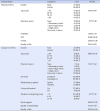Abstract
Purpose
The purpose of this study was to explore the quality of life (QoL) in patients with Alzheimer's disease (AD) and their and caregivers and its influencing factors.
Methods
A descriptive research design was used. 211 pairs of AD patients and their caregivers were recruited from a neurology outpatient clinic of S medical center in Seoul, Korea. Caregivers completed several structured questionnaires regarding AD patients' QoL as well as their QoL, patients' behavioral and psychological symptoms, patients' activities of daily living (ADL), social support, and quality of relationship between AD patients and caregivers. Cognitive status of AD patients was assessed by the researchers using Korean Mini-Mental State Examination.
Results
The scores of QoL were 26.91 for AD patients and 85.62 for their caregivers. In the multiple regression, factors associated with AD patients' QoL were the quality of relationship (β=.44), ADL (β=-.33), patient's age (β=.20), caregivers' QoL (β=.20), and patient's gender (β=.11). Factors associated with caregivers' QoL were the quality of relationship (β=.34), relationship (β=.32), patient's QoL (β=.26), caregivers' gender (β=.18), social support (β=.12), and the level of caregivers' education (β=.12).
Figures and Tables
Table 1
General and Clinical Characteristics of the Patients with Alzheimer's Disease and their Caregivers (N=422)

References
1. Health, Welfare and Family Affairs. 2012 Nationwide study on the prevalence of dementia in Korean elders [Internet]. Seoul: Health, Welfare and Family Affairs;cited 2013 March 3. Available form: http://www.mohw.go.kr/front_new/al/sal0301vw.jsp?PAR_MENU_ID=04&MENU_ID=0403&BOARD_ID=140&BOARD_FLAG=00&CONT_SEQ=286138&page=1.
2. Korean Dementia Association. Dementia: a clinical approach. Seoul: Akademeia;2006. p. 21.
4. Bruvik FK, Ulstein ID, Ranhoff AH, Engedal K. The quality of life of people with dementia and their family carers. Dement Geriatr Cogn Disord. 2012; 34(1):7–14. DOI: 10.1159/000341584.

5. Seoul Metropolitan Center for Dementia. 2014 Utilization of support services by dementia elderly registered on the seoul dementia management project [Internet]. Seoul: Seoul Metropolitan Center for Dementia;2015. cited 2015 February 10. Available from: http://www.seouldementia.or.kr/morgue/paper.asp?pagename=view&num=44715&page=1&search=.
6. Park SJ. A Study on the relationships between life quality of elderly with dementia and family relationship. J Fam Relat. 2011; 16(1):3–17.
7. Burgener S, Twigg P. Relationships among caregivers factors and quality of life in care recipients with irreversible dementia. Alzheimer Dis Assoc Disord. 2002; 16(2):88–102.
8. Novelli MMP, Nitrini R, Caramelli P. Validation of the Brazilian version of the quality of life scale for patients with Alzheimer's disease and their caregivers (QOL-AD). Aging Ment Health. 2010; 14(5):624–631.

9. Zhang S, Guo Q, Edwards H, Yates P, Li C. Self-efficacy moderation and mediation roles on BPSD and social support influences on subjective caregiver burden in Chinese spouse caregivers of dementia patients. Int Psychogeriatr. 2014; 1–9. [Epub ahead of print].

10. Kim JS, Kim MS, Kim SO, Yoo YJ, Won DY. Factors influencing dementia caregivers' health-related quality of life. J Korean Acad Community Health Nurs. 2007; 18(2):232–241.
11. McKhann G, Drachman D, Folstein M, Katzman R, Price D, Stadlan EM. Clinical diagnosis of Alzheimer's disease: report of the NINCDS-ADRDA work group under the auspices of department of health and human services task force on Alzheimer's disease. Neurology. 1984; 34(7):939–944.

12. Jack CR, Albert MS, Knopman DS, McKhann GM, Sperling RA, Carrillo MC, et al. Introduction to the recommendations from the National Institute on Aging-Alzheimer's Association workgroups on diagnostic guidelines for Alzheimer's disease. Alzheimers Dement. 2011; 7(3):257–262.

13. Kim HJ, Moon SY, Kim S, Han SH. A Assessment of the quality of life in patients with Alzheimer's disease. J Korean Neurol Assoc. 2008; 26(4):308–313.
14. Logsdon RG, Gibbons LE, McCurry SM, Teri L. Assessing quality of life in older adults with cognitive impairment. Psychosom Med. 2002; 64(3):510–519.

15. WHO. Development of the World Health Organization WHOQOL-BREF quality of life assessment. Psychol Med. 1998; 28(3):551–558.
16. Min SK, Lee CI, Kim KI, Suh SY, Kim DK. Development of Korean version of WHO quality of life scale abbreviated version (WHOQOL-BREF). J Korean Neuropsychiatr Assoc. 2000; 39(3):571–579.
17. Folstein MF, Folstein SE, McHugh PR. “Mini-mental state”. A practical method for grading the cognitive state of patients for the clinician. J Psychiatr Res. 1975; 12(3):189–198.
18. Kang Y, Na DL, Hahn S. A validity study on the Korean Mini-Mental State Examination (K-MMSE) in dementia patients. J Korean Neurol Assoc. 1997; 15(2):300–308.
19. Cummings JL, Mega M, Gray K, Rosenberg-Thompson S, Carus DA, Gornbein J. The neuropsychiatric inventory: comprehensive assessment of psychopathology in dementia. Neurology. 1994; 44(12):2308–2314.

20. Kang SJ, Choi SH, Lee BH, Jeong Y, Hahm DS, Han IW, et al. Caregivers-Administered Neuropsychiatric Inventory (CGANPI). J Geriatr Psychiatry Neurol. 2004; 17(1):32–35.
21. Ku HM, Kim JH, Kwon EJ, Kim SH, Lee HS, Ko HJ, et al. A study on the reliability and validity of Seoul-Instrumental Activities of Daily Living (S-IADL). J Korean Neuropsychiatr Assoc. 2004; 43:189–199.
23. Ma BS. Study on the people in charge of the demented: especially people in the day care center or short stay service. [master's thesis]. Seoul: Ewha University;1998. 1–93.
24. Archbold GP, Stewart B. Family caregiving inventory. Portland: Oregon Health Sciences University;1996.
25. Yang YH. Theoretical structure model for the caregivers'role stress and health. [dissertation]. Seoul: Seoul National University;1992. 1–133.
26. Kim SY. Suggestions of political alternatives: factors affecting on the QOL of the demented elderly caregivers. Soc Welf Policy. 2003; 17:77–105.
27. Fauth E, Hess K, Piercy K, Norton M, Corcoran C, Rabins P, et al. Caregivers' relationship closeness with the person with dementia predicts both positive and negative outcomes for caregivers' physical health and psychological well-being. Aging Ment Health. 2012; 16(6):699–711.

28. Lee GO. A study on quality of life and its influencing factors in family caregivers caring for dementia patient. J Korean Psychiatr Ment Health Nurs Acad Soc. 2003; 12(1):15–26.
29. Leon-Salas B, Olazaran J, Muniz R, Gonzalez-Salvador MT, Martinez-Martin P. Caregivers'estimation of patients' quality of life (QoL) in Alzheimer's disease (AD): an approach using the ADRQL. Arch Gerontol Geriatr. 2011; 53(1):13–18.
30. Kim JL. A comparative and longitudinal study of Korean and American on quality of life by spousal caregiving role changing type. [master's thesis]. Seoul: Yonsei University;2012. 1–119.




 PDF
PDF ePub
ePub Citation
Citation Print
Print




 XML Download
XML Download